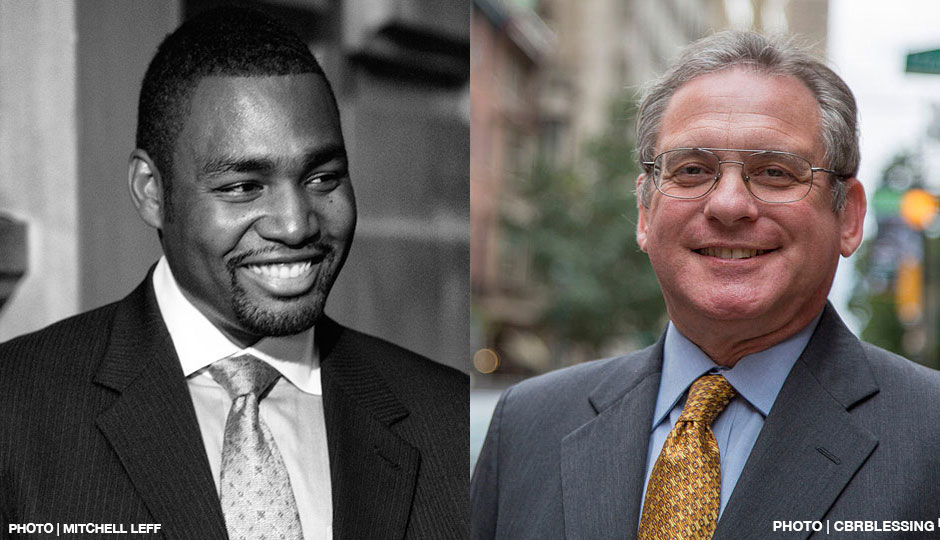Mayoral Halfsies: Butkovitz Out (Sort of), Oliver In (Sort of)
The first real surprise of the mayoral race arrived this week, in the form of the sudden non-withdrawal/withdrawal of candidate/non-candidate Alan Butkovitz. The city controller had never formally declared his intentions, but he’d been assembling a staff and was widely considered one of the more potent candidates in the (admittedly meager) mayoral mix. Now he’s gone, at least for now, and the terrain of the race is considerably changed.
If Butkovitz had entered the race, he likely would have been a well-funded candidate, with a real base in the Northeast and the support of major city political figures. That might not have been enough to secure a win, of course. He certainly would have started the race an underdog to State Senator Anthony Williams, who is emerging as the consensus front-runner. But Butkovitz had a puncher’s chance.
That wasn’t good enough for him, apparently. He told the Inquirer yesterday, “Based on the conditions on the ground right now and the confusion and chaos of the current field right now, I don’t see a path to winning.”
What confusion and chaos is he referring to? Principally the agonizing indecision of Darrell L. Clarke. Butkovitz seems to think Clarke will run. But there’s been no clear signal on that score from Clarke whatsoever.
As one Democratic consultant put it, “Clarke’s sole campaign staffer is representing Philly Jesus right now.”
Clarke could easily get into the race later. He’s been raising money prodigiously, and the fact that Butkovitz bailed suggests a lot of heavy hitters are withholding support for other candidates, presumably because they expect Clarke to get in eventually.
It could be that Clarke’s Prince of Denmark act is calculated and cunning. But it seems just as likely to me that he actually is torn between the specter of watching Williams run away with it (Clarke and Williams are not big buddies), and putting his council presidency at risk in a mayoral campaign where anything can happen.
If Clarke stays out, Butkovitz could get back in. But he’d be asking voters to elect a mayor who sees himself as subservient to the council president, which is a little awkward.
If both Clarke and Butkovitz are out, that could create an irresistible opening for at-large City Councilman Jim Kenney. It could also boost former District Attorney Lynne Abraham‘s campaign, which will be announced for like the third time Wednesday afternoon. But the obvious and huge winner if Clarke and Butkovitz are both gone is Williams. Indeed, without Clarke or another big name black candidate in the race, Williams’ path to victory looks a mile wide … for now. A lot can happen in a mayoral campaign, and there’s enough unease over Williams in enough quarters that another candidate certainly could overtake him.
The Oliver Wrinkle
What about Doug Oliver? The PGW executive and former Nutter spokesman announced Tuesday the formation of a committee to explore a mayoral run. There are a few reasons to take Oliver’s long-shot potential candidacy seriously, and more than a few reasons to think he’s unlikely to have much of an impact.
Why might Oliver matter? He’s a fresh face and young, just 40, which helps differentiate him in a field full of older, all-too-familiar faces. He’s black, in a Democratic field that (right now) is expected to include multiple white candidates and only one other black candidate. As a former press secretary, he’s likable, quick on his feet and far more polished than the vast majority of first-time candidates. Oliver’s also explicitly reaching out to millennials and disaffected voters, which is smart. He’s never going to snag major endorsements or big PAC money, so Oliver is setting out to crowd-fund his campaign with micro-donations, he intends to organize around social media and register new voters by the ton, a la Obama in the 2008 primary (even if his candidacy goes nowhere, if Oliver can show some progress on those fronts, he’ll be a name to watch in the future).
The Oliver cons? He’s not well known, he has no money to start, and, until recently, he was a registered Republican. Oliver switched parties in 2012, and for a while he courted city Republicans in hopes of securing the GOP nomination for mayor. Oliver recently changed his mind. He’s re-registered as a Democrat (the paperwork is in, he says) and will run as a Democrat. Oliver seems to see party affiliation as more or less irrelevant when it comes to municipal policy, but there are sure to be plenty of Democrats who disagree with him.
More than any of the factors above, though, you get a sense talking to Oliver that he really wants the job but doesn’t yet have a lot of ideas about what he’d do if he actually got it. When I asked at the press conference what his policy priorities were, Oliver said figuring that out was largely the point of the this exploratory period. Inquirer City Hall reporter Chris Hepp – a veteran journalist and former city editor for the paper — followed up with a cutting question:
“I hear someone who wants to be mayor who says, ‘I don’t know what I stand for, I don’t know what party I belong in, I’m going to turn to the voters and ask them what they want. Are you a leader or a follower. Do you stand for anything?” Hepp asked.
Oliver handled the question well enough. “I am a leader, there’s no question about that. My exploration into the Republican party was not about confusion it was about learning … I make no apologies for that. And I think the best leadership decisions come from people with that philosophy.”
This field is crying out for a younger candidate interested in engaging new voters, but Oliver would be well served by giving those voters a better sense of what they’d be voting for, sooner rather than later.
Follow @pkerkstra on Twitter.



